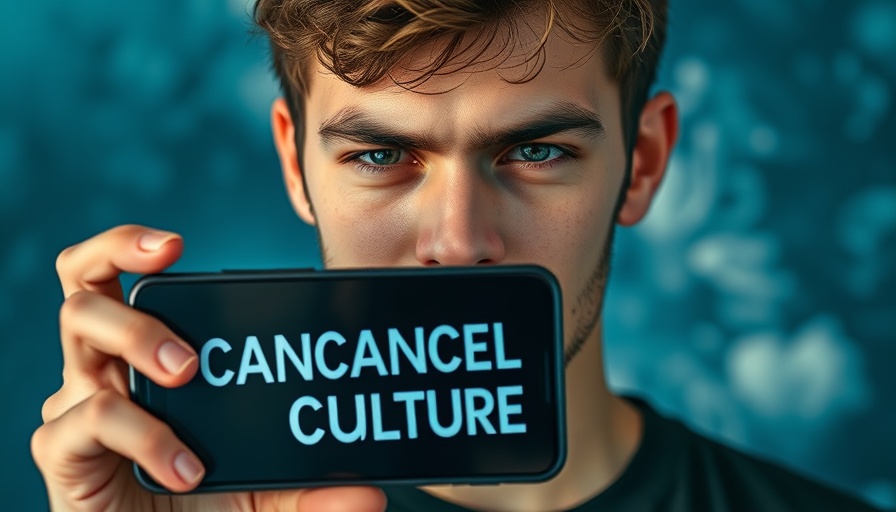
Understanding Cancel Culture: Breaking Down the Concept
Cancel culture has become a buzzword in today’s contemporary discussions, yet it often evokes confusion and misunderstanding around its true meaning. At its core, cancel culture refers to the societal practice of ostracizing, criticizing, or even ‘cancelling’ individuals for their beliefs or behaviors that are deemed unacceptable. However, it’s crucial to differentiate between social sanctions and legal repercussions, as criticisms or social ostracization do not equate to legal banning.
In 'The TRUTH About Cancel Culture', the discussion dives into the implications of this societal phenomenon, exploring key insights that sparked deeper analysis on our end.
The Three Main Perspectives on Cancel Culture
To analyze cancel culture, we can categorize opinions into three distinct perspectives:
- The Harsh Cancellers: This view suggests that any violation of societal taboos deserves strict penalties, often endorsing extreme social backlash.
- The Absolute Free Speech Advocates: This stance argues that no behavior should lead to cancellation, suggesting that individuals should be free to express any opinion, regardless of its acceptability in society.
- The Moderate Approach: The most balanced perspective recognizes that while some behaviors indeed warrant social consequences, not all do. It calls for nuance and a flexible application of social sanctions.
The Dangers of Extremism in Cancel Culture
The extremes of both the harsh cancelers and the free speech advocates contribute to a polarized climate where constructive dialogue is stifled. The keyboard warriors on social media platforms often mobilize in packs to condemn those who dare to cross certain lines. This cycle of extreme reaction leads to fears of public ridicule or loss of employment for anyone expressing unpopular opinions, resulting in a chilling effect on free speech.
The Role of Social Media in Amplifying the Issue
Social media has exacerbated the cancel culture phenomenon, transforming individuals into targets for mob justice at a moment’s notice. This immediacy often prevents any rational conversation, forcing users to take sides, thereby limiting their ability to engage in nuanced debate or reconsider their positions on issues. In a world driven by likes, shares, and trending hashtags, individuals frequently opt for silence over the fear of social ostracization.
The Fine Line Between Accountability and Censorship
One of the essential discussions around cancel culture is accountability. While it is vital to hold people responsible for harmful actions or speech, where do we draw the line? When does accountability morph into censorship? Navigating this landscape requires a balance, prompting society to reflect on the implications of social consequences versus the potential for forgiveness.
Understanding the Counterproductive Nature of Mobs
Reacting to provocation with extreme measures often begets further hostility. In cases where one side validates its worst actors in retaliation, it leads to a cycle of increased polarization. Political and social discourse devolves into threats and antagonism, compromising the social contract we share. Learning to counteract the mob mentality by advocating for individual responsibility and a broader discussion of moral expectations could lead to a healthier societal environment.
A Call for Forgiveness and Progress
For a progressive society, forgiveness must play a pivotal role in the conversation surrounding cancel culture. Encouraging an environment where individuals can learn from their mistakes rather than be permanently ostracized supports a culture of growth and understanding rather than fear and repression. We must remember that everyone makes mistakes, and offering the chance to learn from them promotes a more inclusive society.
The Path Forward: Navigating the Way
Moving away from extreme positions towards a more moderate perspective can foster better dialogue in our communities. Those on both sides of the canceling spectrum need to reassess their approaches. Only through mutually respectful interactions and a commitment to understanding differing opinions can we create a more productive conversational landscape where freedom of speech thrives.
In conclusion, navigating the complexities of cancel culture requires thoughtful engagement and a genuine effort to understand diverse perspectives. The stakes are high, as we strive to create a society where individuals can express ideas freely while holding each other accountable. Let’s work towards a future where dialogue prevails over division.
 Add Row
Add Row  Add
Add 




Write A Comment